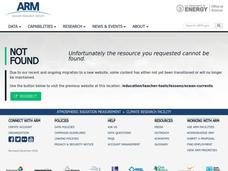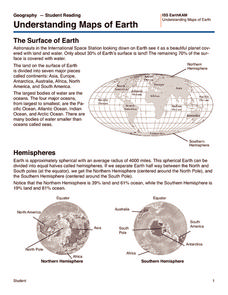Baylor College
Tools of Magnification
Life science learners need to be able to use a microscope. With this comprehensive resource, they first experience how lenses and magnification work, and then get familiar with using a compound microscope. Tremendous background...
Exploratorium
Indicating Electrolysis
Sure, your learners know water is made up of two molecules, but watching them separate helps the class see the construction like never before. This resource provides directions on how to build a simple electrolysis device using a...
Herff Jones Education
Reaction Rates
Equip pupils with tools to determine reaction rates as they explore conditions that cause a reaction to increase or decrease. They also discuss why this occurs and predict the next steps as they take part in a series of experiments.
NOAA
The Great, Glowing Orb What You Will Do: Make a Solar Heat Engine
How is solar energy able to move wind and water to control the climate? Scholars explore the concept of solar energy in the first of 10 activities in the Discover Your Changing World series. They follow instructions to build homemade...
Climate Research Facility
Ocean Currents
Young scientists investigate the effects of heating a beaker of ice water by dropping dye into the water and observing how the color circulates.
Institute for Geophysics
Understanding Maps of Earth
Here is your go-to student resource on primary geography concepts, including facts about the surface of the earth and its hemispheres, latitude and longitude, globes, types of maps, and identifying continents and oceans.
Discovery Education
School of Rock
Why do rocks break down over time? Learners explore this concept by simulating physical and chemical weathering of different types of rocks. They use an abrasive to demonstrate physical weathering and acid to demonstrate chemical...
Exploratorium
Penny Battery
Use pennies to light an LED. Class members follow the provided directions to build a multi-celled battery powered by pennies. Using stacks of pennies of varying heights, pupils control the voltage of the battery to light different colors...
It's About Time
Polymers
All plastics contain polymers, but not all polymers are plastic. Young chemists make their own polymer and compare the properties to those of other states of matter. After a reading passage, pupils answer analysis questions about natural...
Kate Stickley
Reading the World: Latitude and Longitude Lesson latitude and longitude, maps, coordinates on a map, prime meridian, reading maps, equator, globes
Find five activities all about longitude and latitude! Use oranges to show the equator and prime meridian, plot birthdays on a map using coordinates, and plan a dream vacation.











